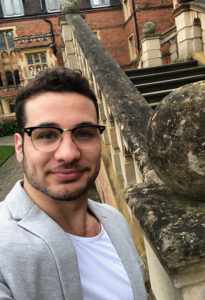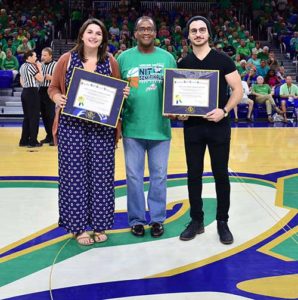
Students who want to follow in the footsteps of FGCU’s first Fulbright scholars should develop a project they feel passionate about and are willing to invest considerable time honing.
That’s one piece of advice Honors College alumnus Emilio Feijoo shared with current Eagles when he visited campus this fall prior to heading back to England to begin graduate studies in sociology in the University of Cambridge’s Selwyn College. He discovered a common research interest in social theory and public intellectuals with the college’s director of Studies in Human, Social and Political Sciences, who agreed to take on Feijoo as a graduate assistant.
The yearlong master’s program there will extend the studies he’s already completed for his first master’s in the Ideology and Discourse Analysis Program at the University of Essex, also in England.
Feijoo, 26, graduated from FGCU in December 2015 with bachelor’s degrees in philosophy and English and minors in French, German and world literature. The following spring he was selected for the yearlong Fulbright Study/Research Grant that took him to the University of Essex. He was one of the first two FGCU students to be named Fulbright fellows — and he hopes there will be many more.
“That’s one reason I’m here,” he said while revisiting his alma mater. “I want to give flesh and blood to this. It can be done, but you have to be passionate about it. The Fulbright people are looking for a good story, and potential candidates who will be successful in their field. If you have a good story and a good project and are doing everything you can on your end to make that come to fruition, they see that self-motivation. They see you’re not just doing the Fulbright to look good on paper.”
Feijoo estimates he spent about two years developing and revising his Fulbright proposal, with input from close to a dozen people.
“You have to have an idea or project in mind that really grips you. Find a critical voice, don’t be complacent, ask the right questions, and ultimately do the gritty work. Ask yourself how you can make your project or idea come to life in other people’s heads and hearts. The practical part — the statement of purpose — it’s important to revise, revise, revise. There’s a particular skill to these, a skill you develop to really create a narrative. Eventually you will use that skill further down the line if you become an academic.”

In the research/study category that Feijoo submitted his proposal in, only 36 of 1,031 applicants for programs in England were offered grants for 2016-17. The Essex program admits only a handful of students a year, and Feijoo was accepted before he was awarded the Fulbright. He was interested in exploring how a theory of poetry translates into a theory of politics, how theory can be integrated into civil society, how principals of radical democracy can be put into practice.
In the course of what he called “a rigorous year” at Essex, Feijoo broadened his international perspective in those areas and more. He bonded with peers from around the world over shared political and philosophical interests. Together, they organized an international conference with funding from the university that drew 100-150 politicians, academics and students from across Europe — “the biggest achievement” of his time abroad, he said.
“Overall, the year was amazing,” he said. “The university was very welcoming. The people were down to earth, very intelligent, passionate. It was a very interesting time to be in Europe, especially with the 2016 U.S. election happening.”
At the end of his Essex immersion, Feijoo returned to Southwest Florida to finish his dissertation while working to put some money aside. While processing his experiences abroad and pondering his next steps, Hurricane Irma hit.
“It was a good metaphor for the year,” he said. “It was intense.”